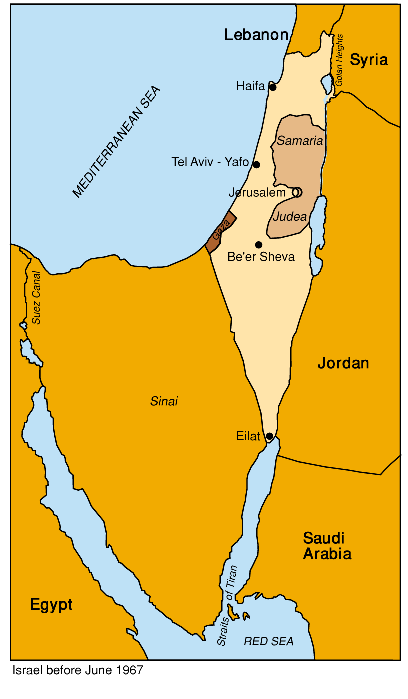There are two articles worth reading about this anniversary today. The first, courtesy of Little Green Footballs, is a link to the TIME coverage of he Six Day War from the day it happened. It's interesting to read the article and notice that not once in the entire article is there a mention of the Palestinians.
This is because the "Palestinians" didn't exist back then. They were Arabs that belonged to either Egypt, Jordan, Lebanon or Syria. Here is a pre-1967 map of Israel, notice that there is no Palestinian nation listed.

The TIME article is fascinating for a number of reasons, but the most stunning is the unabashed conclusion at the end of the article that seems to justify Israels actions without any consequence.
In the last analysis, though, it was the Israeli military virtues of superb tactics and timing, its professionalism in the martial arts, that turned an Arab defeat into a classic rout likely to be studied with admiration at war colleges the world over. Beyond those tangibles there looms the dedication of the Jews, forged in thousands of years of dispersions and persecutions, their inviolable determination to ensure modern Israel's survival as a nation. "Everybody fought for something that is a combination of love, belief and country," said Moshe Dayan at week's end. "If I may say so, we felt we were fighting to prevent the fall of the Third Temple."
It is hard to imagine this today, but TIME during the Six Day War supported Israels right to defend themselves.
The other article worth reading in regards to this anniversary is the following editorial from Brett Stephens in the Wall Street Journal, "No Pyrrhic Victory". It's subscription only, but I'll post the excerpts that are the most significant here.
This act of military pre-emption helped save Israel from what Iraq's then-President Abdul Rahman Aref had called, only several days earlier, "our opportunity . . . to wipe Israel off the map." Yet 40 years later Israel's victory is widely seen as a Pyrrhic one -- "a calamity for the Jewish state no less than for its neighbors," according to a recent editorial in the Economist.
And the alternative was?
The Six Day War is supposed to be the great pivot on which the modern history of the Middle East hinges, the moment the Palestinian question came into focus and Israel went from being the David to the Goliath of the conflict. It's a reading of history that has the convenience of offering a political prescription: Rewind to the status quo ante June 5, arrange a peace deal, and the problems that have arisen since more or less go away. Or so the thinking goes.
Yet the striking fact is that all of Israel's peace agreements -- with Egypt in 1979, with the Palestinians in 1993, with Jordan and Morocco in 1994 -- were achieved in the wake of the war. The Jewish state had gained territory; the Arab states wanted it back. Whatever else might be said for the land-for-peace formula, it's odd that the people who are its strongest advocates are usually the same ones who bemoan the apparent completeness of Israel's victory in 1967.
And no post about Israel and the Six Day War would be complete without my personal favorite explanation of the current situation regarding Israel and the surrounding Arab nations than the excellent article written by the comedian Larry Miller in the Weekly Standard, "Whosoever Blesses Them"-
Chew this around and spit it out: Five hundred million Arabs; five million Jews. Think of all the Arab countries as a football field, and Israel as a pack of matches sitting in the middle of it. And now these same folks swear that if Israel gives them half of that pack of matches, everyone will be pals. Really? Wow, what neat news. Hey, but what about the string of wars to obliterate the tiny country and the constant din of rabid blood oaths to drive every Jew into the sea? Oh, that? We were just kidding.
Thank God that Israel defended itself 40 years ago in the manner it did.
HaShem Yitbarach Eretz Yisrael!

No comments:
Post a Comment